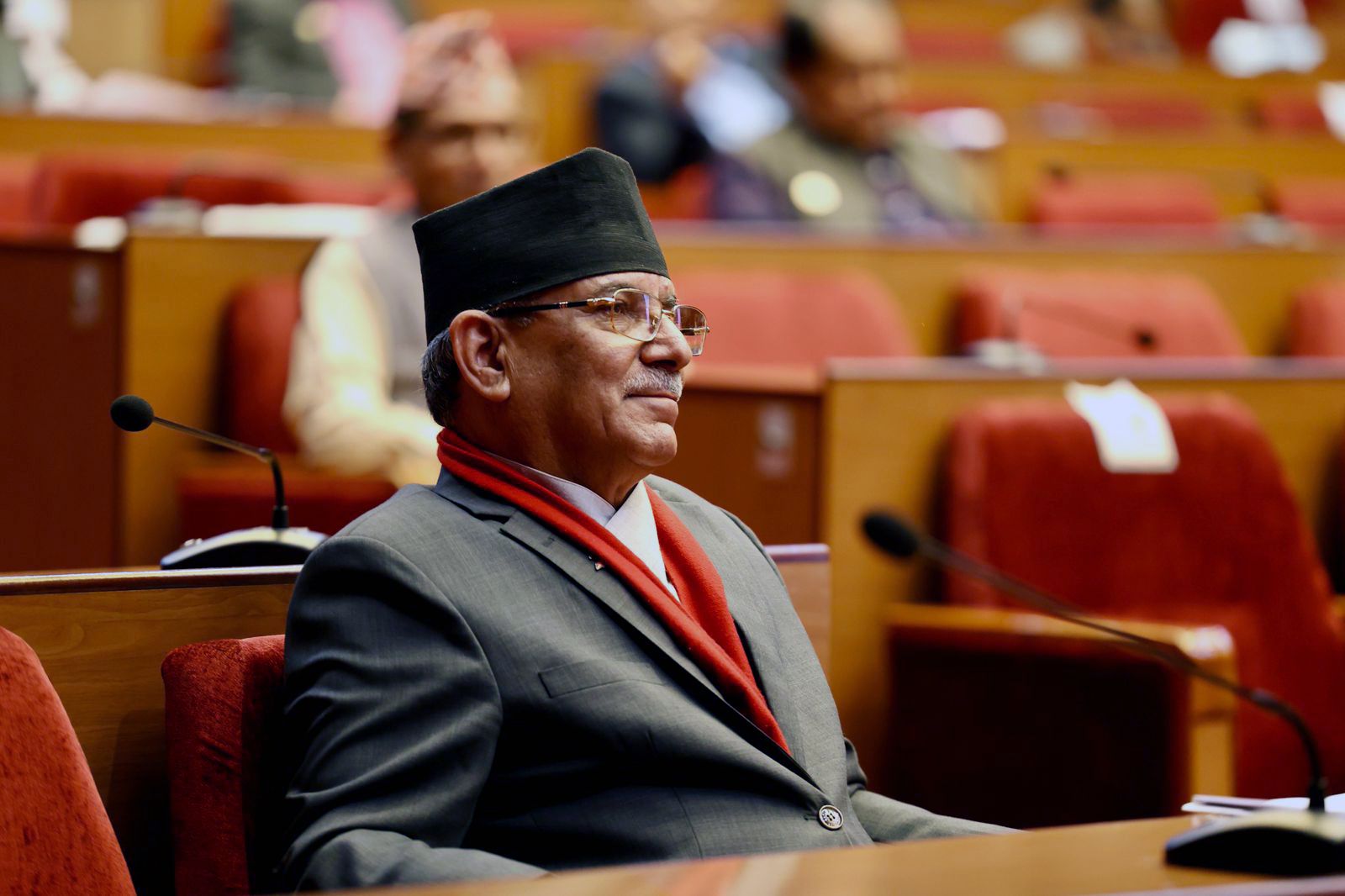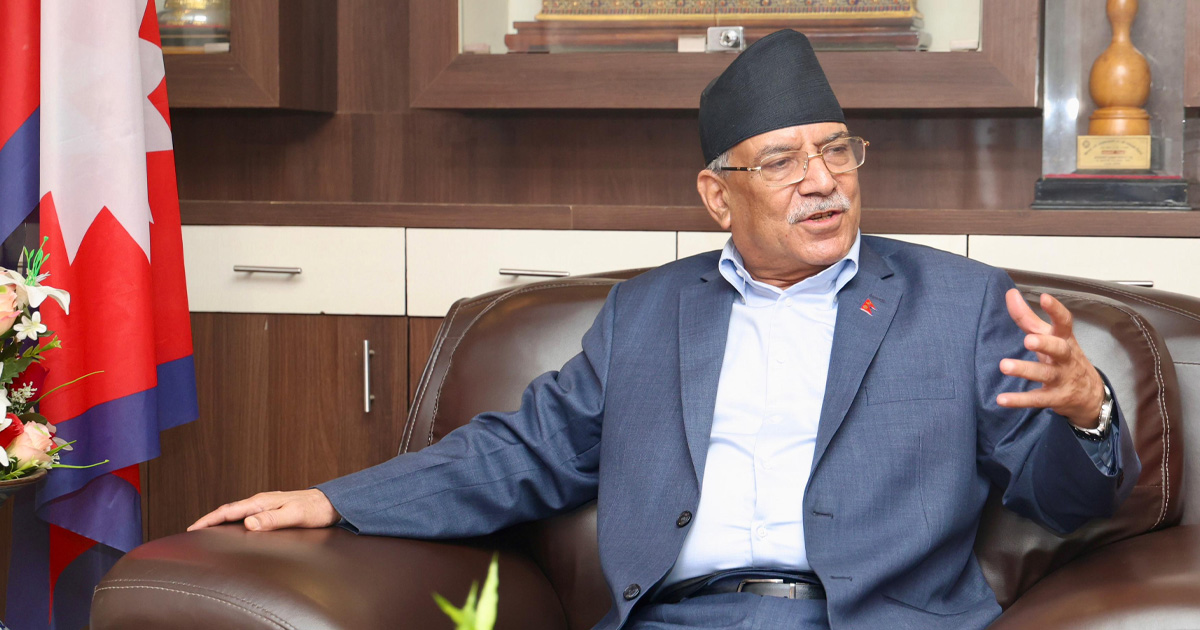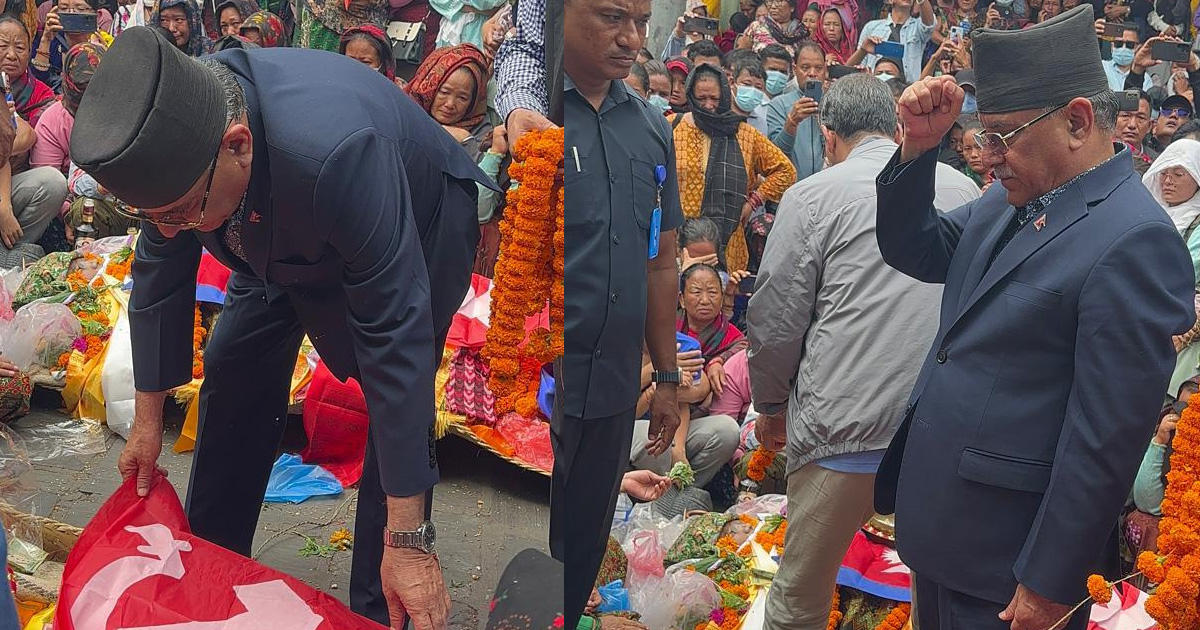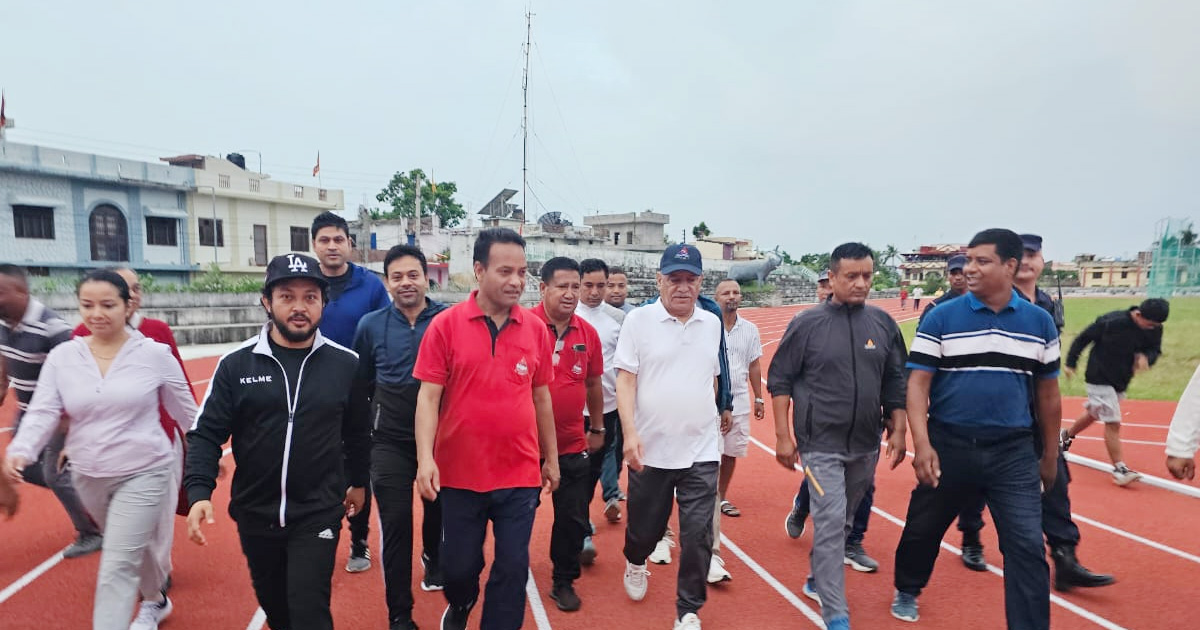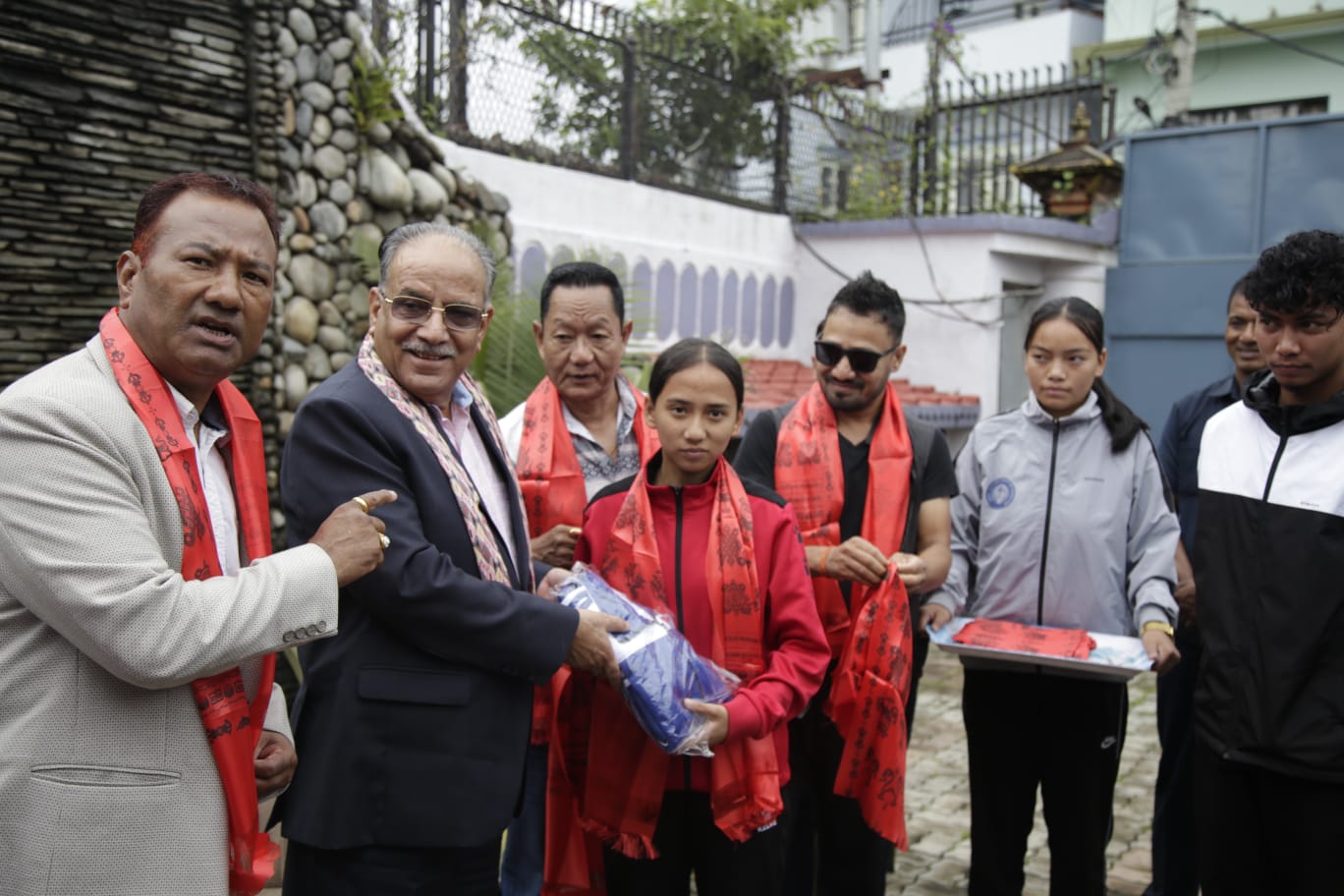1. The Rt. Hon’ble Mr. Pushpa Kamal Dahal ‘Prachanda’, Prime Minister of Nepal, and Ms. Sita Dahal are on a State visit to India from 15-18 September 2016 at the invitation of the Hon’ble Prime Minister of India, Shri Narendra Modi. The delegation includes the Minister for Foreign Affairs of Nepal Dr. Prakash Sharan Mahat, the Minister for Physical Infrastructure and Transport Mr. Ramesh Lekhak, members of the Legislature-Parliament, and other senior officials of the Government of Nepal.
2. During the visit, Rt. Hon’ble Prime Minister of Nepal was accorded ceremonial reception at the Rashtrapati Bhawan on 16 September 2016. He paid courtesy call on the Hon’ble President of India Shri Pranab Mukherjee, and held talks with the Hon’ble Prime Minister of India. Smt Sushma Swaraj, Minister of External Affairs, Shri Arun Jaitley, Minister of Finance, Shri Piyush Goyal, Minister of State for Power (Independent Charge) called on the Rt. Hon’ble Prime Minister of Nepal. Hon’ble Prime Minister of India hosted an official banquet in honour of the visiting dignitary and the accompanying delegation. Prime Minister Prachanda will be visiting Nathpa Jhakri hydro-electric power project in Himachal Pradesh and the Food and Herbal Park at the Patanjali Yogpeeth near Haridwar. An interaction with the Indian business community was jointly hosted by ASSOCHAM, CII and FICCI in honour of the visiting dignitary.
3. Bilateral meetings were held in an atmosphere of utmost cordiality and warmth that have characterized the close and friendly relations between India and Nepal. The Prime Minister of India thanked the Prime Minister of Nepal for accepting his invitation, and warmly welcomed him in India on his first visit abroad since assuming office in August 2016. He stated that the visit would help further strengthen the age-old bonds of fraternal relations between the people of India and Nepal, and expand the multi-dimensional cooperation between the two countries. The two Prime Ministers agreed that the high-level exchanges are vital for maintaining the momentum towards further deepening of the close and cordial ties between the two countries.
4. The Prime Minister of Nepal thanked his Indian counterpart for the invitation and warm hospitality extended to him and his delegation since their arrival. He stated that his visit to India demonstrates the importance that the Government of Nepal attaches to good neighbourly relations with India. The two countries and their people share an ancient, deep-rooted and vibrant friendship based on a shared cultural and civilizational ethos. He expressed the willingness of the Government of Nepal to explore newer areas of mutual cooperation and partnerships and to take our age-old and unique ties to new heights, while reinvigorating the existing mechanisms for enhancing mutual benefit.
5. The two Prime Ministers reviewed the entire gamut of bilateral cooperation and underlined the need to further deepen and expand bilateral cooperation in all areas for the mutual benefit of the people of the two countries. They directed that all bilateral institutional mechanisms be convened regularly and their decisions be implemented expeditiously. Both sides agreed to hold the next session of the India-Nepal Joint Commission in 2016.
6. The two Prime Ministers noted the progress in promoting sub-regional cooperation, and agreed that the two governments should explore ways to further enhance it, particularly in the areas of trade, transit, connectivity and power. They also stressed the importance of enhancing regional cooperation within the framework of the SAARC and the BIMSTEC.
7. The two Prime Ministers noted that the first meeting of the Eminent Persons Group on Nepal-India Relations was held in Kathmandu in July 2016, and hoped that the Group would work intensively and look into the totality of India-Nepal relations from independent perspective and suggest measures to consolidate and further expand the close and multi-faceted ties between the two countries.
8. The Prime Minister of Nepal thanked for the prompt and extensive assistance provided by the Government and people of India in the aftermath of the devastating earthquakes of 25 April and 12 May 2015. He conveyed his gratitude to the Government of India for the latter’s special assistance package of US$ 1 billion for Nepal’s post-earthquake reconstruction.
9. The Prime Minister of India welcomed the setting up of the National Reconstruction Authority (NRA) in Nepal, which will coordinate post-earthquake reconstruction projects. The two Prime Ministers agreed that expeditious action should be taken to implement mutually agreed projects in the identified sectors for post-earthquake reconstruction in accordance with the bilateral MOU signed in February 2016. At the request of the Nepali side, the Indian side agreed to extend assistance to the NRA, including through sharing of experience and capacity building by the National Disaster Management Authority of India. In response to the declared policy of the Government of Nepal to grant NRs 3 lakh to each beneficiary for reconstruction of houses, Government of India conveyed that it would increase its contribution for 50,000 households from NRs 2 lakh to NRs 3 lakh. For this purpose, US $ 50 million will be drawn by the Government of Nepal from the LOC of US $ 750 million for post-earthquake reconstruction.
10. The Prime Minister of Nepal shared with the Prime Minister of India developments in Nepal. He conveyed that the promulgation of the Constitution last year is a historic event in institutionalizing federal democratic republic. He also shared the efforts made by the present Government to take all sections of Nepali society on board for the effective implementation of the constitution. While appreciating the importance of the constitutional consolidation of democracy in Nepal, Prime Minister of India welcomed the ongoing efforts of
the Government of Nepal to take all sections of the society on board for effective implementation of the Constitution. Prime Minister of India wished the Prime Minister of Nepal every success in this endeavour. The Prime Minister of Nepal thanked the Government and people of India for their goodwill, support and solidarity in Nepal’s peace process.
11. The two Prime Ministers believe that both countries hold similar views on major international issues, including the comprehensive reforms of the UN and other international organizations, affecting the developing countries and work in close coordination with each other in the United Nations and other international fora. The Nepali side reiterated its support for India’s candidature for permanent membership of the UN Security Council.
12. The two Prime Ministers noted with satisfaction the ongoing defense and security cooperation, and the recently concluded Home Secretary level talks and the meeting of the bilateral consultative group on security matters. They stressed the need to ensure that the open border, which has facilitated economic interaction and movement of people and goods on both sides of the border and has been a unique feature of India-Nepal bilateral ties, is not allowed to be misused by unscrupulous elements posing security threats to either side. The two sides committed that they will not allow their territory to be used against each other.
13. The Prime Minister of India expressed India’s commitment to continue the close partnership between India and Nepal for socio-economic, scientific and technological development. The two Prime Ministers directed the officials to closely monitor progress of the ongoing projects under bilateral economic and development cooperation, address any bottlenecks, and to complete them expeditiously in a time bound manner. In this regard, both sides agreed to set up an oversight mechanism comprising senior officials from the Indian Embassy in Kathmandu and the Government of Nepal, which will review progress together with respective project implementing agencies/developers of ongoing economic and development projects on a regular basis, and take necessary steps to expedite their implementation.
14. The two Prime Ministers expressed satisfaction at the steady growth of bilateral trade. Prime Minister of Nepal expressed concern over Nepal’s growing trade deficit with India and underlined the need for taking measures to enhance Nepal’s exports to India. The two Prime Ministers noted the successful conclusion of the meeting of the Inter-Governmental Committee (IGC) on Trade, Transit and Control of Unauthorized Trade, at the Secretary-level in June 2016, and agreed that the IGC will continue to discuss trade infrastructure and trade facilitation related measures to boost bilateral trade. They agreed that the Trade Treaty between India and Nepal would be renewed in October 2016 in terms of provisions of the Treaty, with the aim of enhancing the bilateral trade. Both sides agreed to hold civil aviation talks to discuss air services matters, including request for additional air routes.
15. The two Prime Ministers noted the successful completion of two roads totalling about 71 kilometers under Phase I of Terai road project. The two Prime Ministers directed the officials to expedite the construction of postal roads and feeder roads (Terai roads) and complete them expeditiously, in accordance with the modalities for implementation agreed by both sides in February 2016.
16. The two Prime Ministers stressed the need for early development of infrastructure at integrated check posts (ICPs) to facilitate smooth and faster movement of people and goods. They noted with satisfaction the progress in construction of Integrated Check Posts (ICPs) at Raxaul and Jogbani, and agreed that work on the Raxaul-Birgunj ICP project will be expedited with the objective of completing it by December 2016. It was decided to immediately commence construction of the ICP at Biratnagar, and to expedite the Detailed Engineering Reports in respect of ICPs at Nepalgunj and Bhairahawa.
17. The two Prime Ministers reviewed the progress made in the implementation of the two ongoing India-Nepal cross border rail-link projects – (a) Jayanagar-Bijalpur-Bardibas and (b) Jogbani-Biratnagar, and agreed that both sides will take further measures necessary for expeditious completion of both the projects. Both sides agreed that steps will be initiated to facilitate development of three other agreed cross-border rail-link projects (Nepalgunj-Nepalgunj road; Kakarbitta-New Jalpaiguri; Bhairawaha – Nautanwa) so that the land acquisition can commence on the Nepali side.
18. The two Prime Ministers directed the officials to expedite the construction of sub-station at Dhalkebar so that the Muzaffarpur-Dhalkebar transmission line can be operated at its full capacity as planned. It was decided that the construction of transmission lines (i) from Kataiya to Kusaha, and (ii) from Raxaul to Parwanipur will be completed by December 2016 to augment grid connectivity and power supply between the two countries. The two Prime Ministers expressed satisfaction that both countries are engaged in preparation of a Master Plan for the cross-border interconnection for the period until 2035 and Action Plan on power trade until 2025.
19. The two Prime Ministers reviewed progress of other major hydro-power projects, Pancheshwar, Upper Karnali and Arun-III, and noted that various issues be addressed expeditiously with a view to implementing the projects in a time-bound manner so that their benefits start accruing to the people at the earliest. It was decided to expedite finalization of the Detailed Project Report of the Pancheshwar multi-purpose project. It was agreed that both sides will continue to take measures to operationalize the Power Trade Agreement signed in 2014. Both sides agreed to discuss all water resources cooperation related matters such as inundation and flood management, irrigation matters and other major projects, at the next meeting of the Joint Committee on Water Resources at the Secretary level, to be convened at an early date.
20. The two Prime Ministers welcomed the signing of the MOU for the construction of Raxaul-Amlekhgunj petroleum pipeline in August 2015 and
directed that construction work be undertaken expeditiously.
21. Both the Prime Ministers expressed satisfaction at the utilisation of the two Lines of Credit of US$ 100 million and US$ 250 million for development of roads and power infrastructure in Nepal. The two Prime Ministers welcomed the allocation of US$ 200 million for irrigation projects, and US$ 330 million for development of roads and Mahakali bridge from the LoC of US$ 550 million. Both sides expressed their commitment to early implementation of these projects. At the request of Nepal, India conveyed its willingness to extend an additional line of credit to take up projects namely, Hulaki Rajmarg (Phase-II); cross-border transmission line connecting Butwal, 400 KV sub-stations at Dhalkebar and Hetauda, and a polytechnic in Kaski District.
22. The two Prime Ministers expressed satisfaction at the performance of the Indian Joint Ventures in Nepal and emphasized the need for channelizing more Indian investments into Nepal according to its development priorities. They underlined the need for a secured environment for the investors to project Nepal as an attractive destination for foreign investment.
23. The two Prime Ministers welcomed the commencement of work for construction of a Dharmashala at the Pashupatinath Area. The MOU between the Pashupati Area Development Trust and the Archeological Survey of India for reconstruction and renovation of the monuments at the Pashupatinath Area will be finalized expeditiously.
24. The two Prime Ministers stressed the need for taking forward the cooperation in the fields of tourism and ayurvedic system of health care. In this regard, both sides will take steps to fully implement the MOUs on cooperation in Traditional Medicine and on Tourism Cooperation, including development of tourism in the form of Buddhist and Hindu pilgrim circuits.
25. The Prime Minister of Nepal extended an invitation to the Prime Minister of India to pay an official visit to Nepal. The Prime Minister of India accepted the invitation. The date will be finalized through diplomatic channels.
—- New Delhi 16 September, 2016
 क. प्रचण्ड
क. प्रचण्ड
